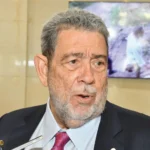(REALNEWS)Attorney-at-law Wendel Robinson is concerned that the Office of the Director of Public Prosecutions (DPP) will be taking over the prosecution of former MP Dean Jonas, who is expected to return to court at the end of this week.
Jonas made his first appearance in the St. John’s Magistrates Court on Monday February 27, after having been arrested and charged last Thursday, February 23, with battery on a police officer; making use of threatening language; resisting arrest; and disorderly conduct.
Based on a request from the police prosecution, and after she confirmed Jonas’ station bail, Chief Magistrate Joanne Walsh adjourned the case to Friday, March 3.
According to the prosecution, a Crown Counsel from the DPP’s Office will be taking charge of the matter.
However, upon hearing the prosecution’s request, Robinson objected, saying that his client is ready to proceed. Pundits say this is not the norm for attorneys – unless their client is expecting to plead guilty. On a first court appearance, a defense lawyer is not ready to try a case; neither would the prosecution be ready, a source says.
Robinson, a former commissioner of police, was adamant that the police had had enough time – four days – to prepare and put their case in order.
Further, since the police have already released the related body-cam footage – revealing all the facts of the case – they should be ready to proceed, he says.
More importantly, Robinson is asking why the DPP’s Office is taking over the prosecution when all the alleged offences were committed under the Small Charges Act.
However, in spite of Robinson’s points, Chief Magistrate Walsh granted the adjournment.
Jonas believes the police contravened his constitutional rights, and he has threatened to sue the arresting officer, the police commissioner, and the attorney-general.
The officers went to Jonas’ Scott’s Hill home to investigate a reportedly domestic issue, which involved the mother of one of his children.
Jonas became upset and began shouting at the police, ordering them to leave his property. He later approached an officer and – although he had been warned – aggressively put his hand in the lawman’s face. The latter then held onto Jonas, and arrested and charged him.
Meanwhile, persons following this case are reminded that the Criminal Prosecutions Services Act, 2017, brought the prosecution of all criminal matters under the ambit of the Director of Public Prosecutions (DPP), forestalling Robinson’s concerns.
It was passed in the Lower House on October 19, 2019, and later in the Upper House.
This means that the Police Force, which used to prosecute summary matters in the Magistrates Court, no longer has the sole responsibility to do so. The Office of the DPP is now the principal prosecutorial agency.
Crown Counsels attached to the DPP’s Office were expected to be dispatched to handle cases in the lower courts; however, the status quo has not changed, and police officers are still allowed to prosecute matters.
Section 31 of the Police Act, passed on January 2, 1951 – which gave officers the right to prosecute criminal matters – was expected to be repealed.
Criminal matters coming out of the Office of National Drug Control and Money Laundering Policy (ONDCP); the Police Force; and the Customs, Immigration and Labour Departments should fall under the directive of the DPP.
Under the Act, the DPP has the authority to decide whether proceedings should be instituted or discontinued; what charges should be laid; and the mode of trial suitable for a particular case –whether summary (in the Magistrates Court) or indictably (in the High Court before a judge and jury).
The police retain the responsibility for investigating criminal matters in Antigua and Barbuda.










